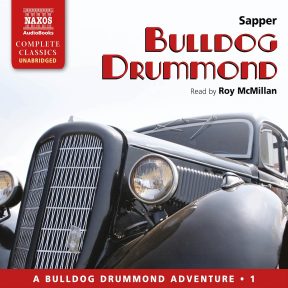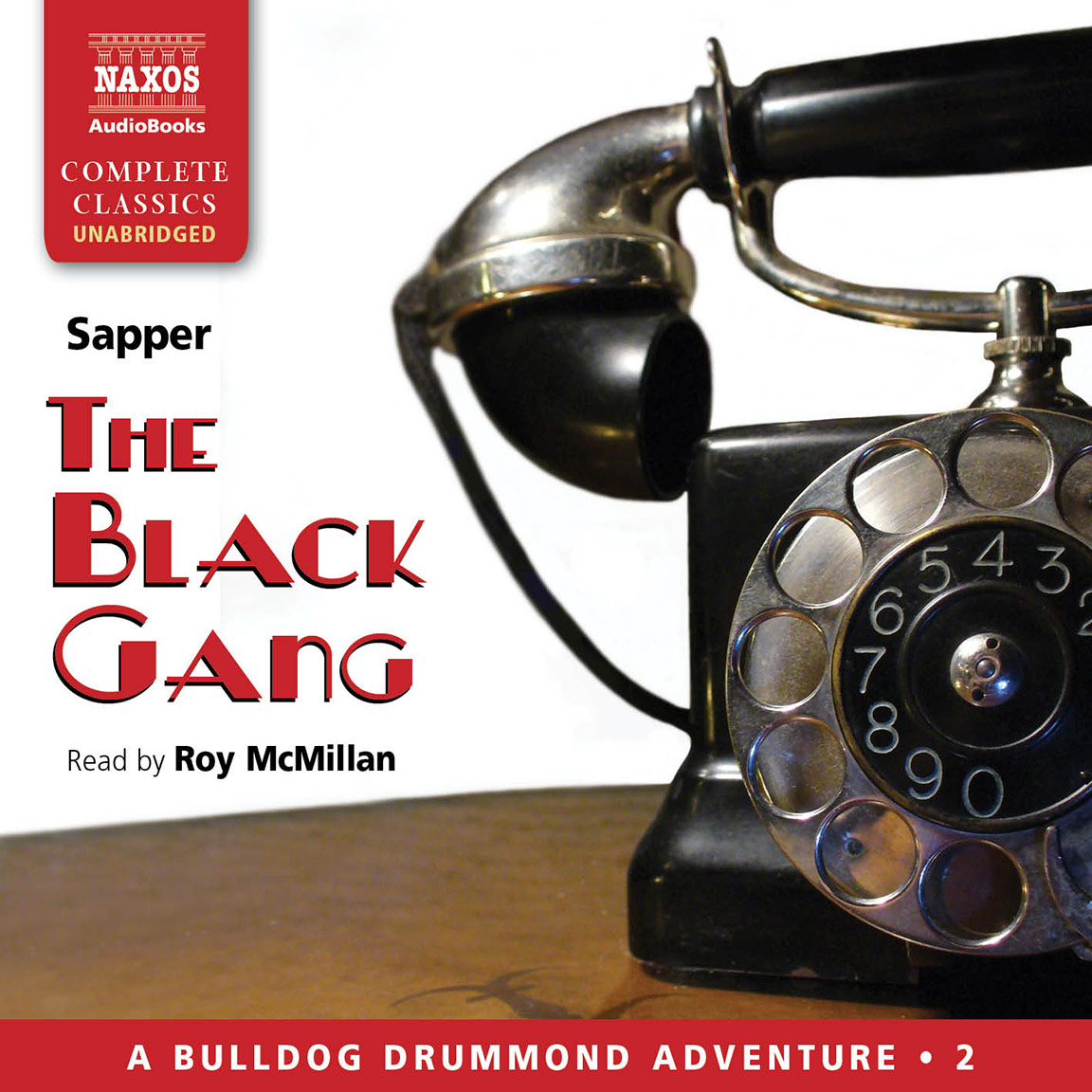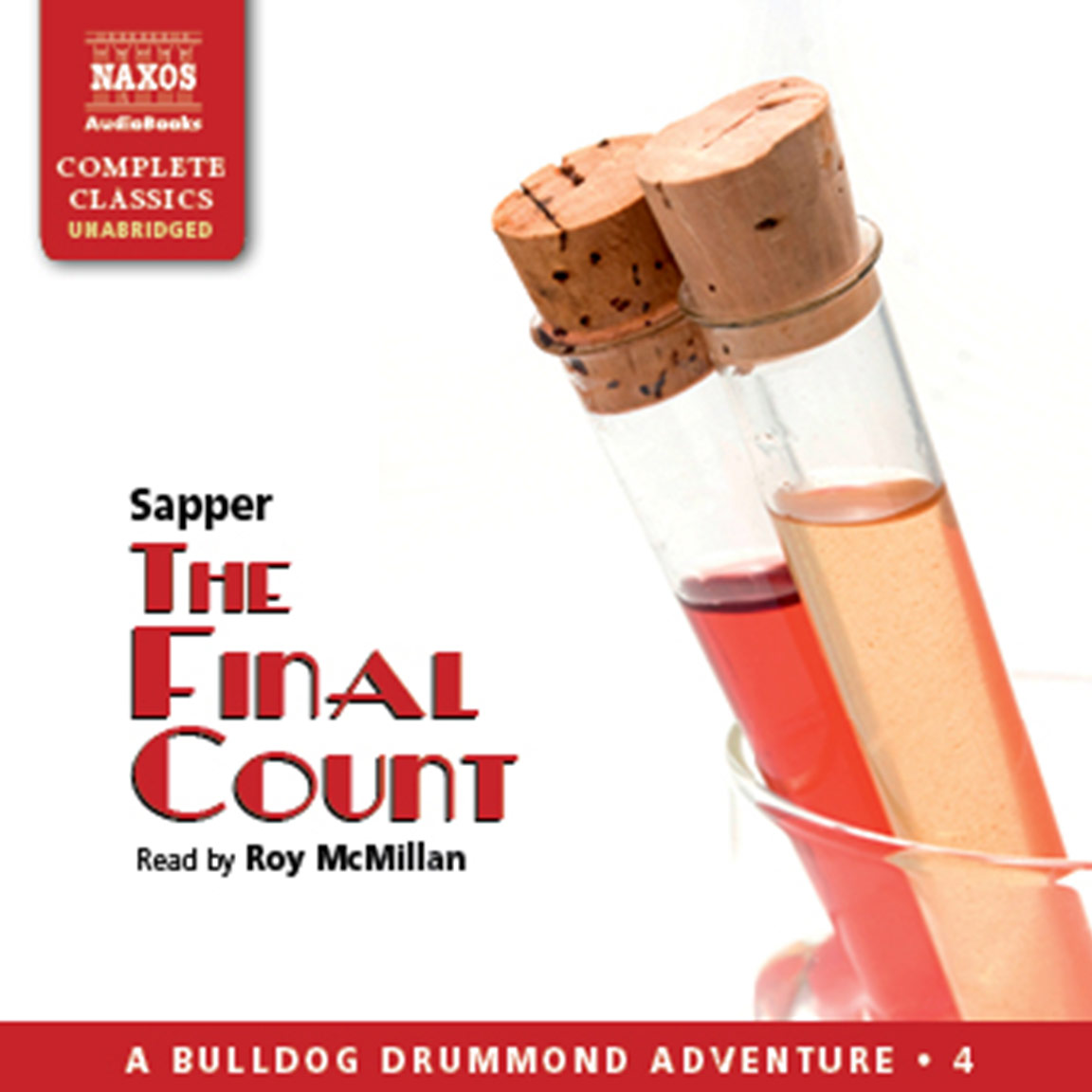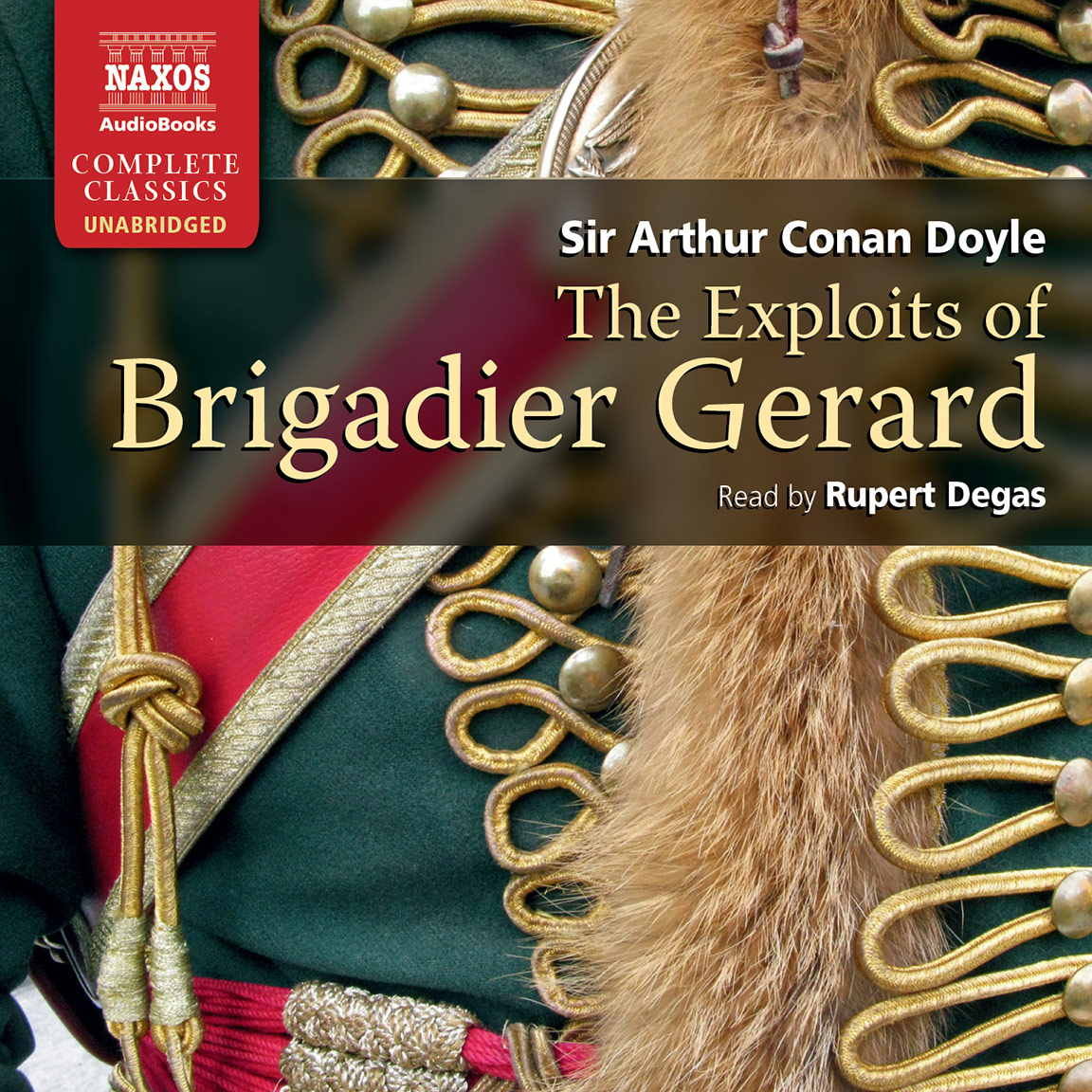
Audio Sample
Sapper
Bulldog Drummond
Read by Roy McMillan
unabridged
Demobilised officer, finding peace incredibly tedious, would welcome diversion. Legitimate if possible; excitement essential. When Captain Hugh Drummond, DSO, MC placed that advertisement, he was looking for adventure. What he finds is an international plot headed by the greatest criminal mastermind in the world. For the sake of the beautiful Phyllis, he faces murderous schemers, acid baths and even wild animals in his attempts to save her father – and his own life. In this, his first appearance, Bulldog Drummond is charming, undaunted and endlessly resourceful: the template of the modern action hero.

-
Running Time: 8 h 39 m
More product details
Digital ISBN: 978-962-954-933-6 Cat. no.: NA712912 Download size: 126 MB BISAC: FIC002000 Released: January 2010 -
Listen to this title at Audible.com↗Buy on CD at Downpour.com↗Listen to this title at the Naxos Spoken Word Library↗
Due to copyright, this title is not currently available in your region.
You May Also Enjoy
Reviews
Many older listeners will have fond childhood memories of reading Bulldog Drummond. Herman McNeile (1888–1937), a vital link between Sir Arthur Conan Doyle and Ian Fleming and rich in 1920s social colour, is ripe for revival. He used the pseudonym Sapper for his tales of the trenches because, as a serving member of the Armed Forces he was required to do so, and he kept it on for the nine Drummond novels. These are summed up by the narrator and presenter Roy McMillan as ‘James Bond written by P. G. Wodehouse’. Our hero’s adventures begin when he inserts a personal advert asking for ‘diversion, legitimate if possible, excitement essential’. He gets it in spades in the non-stop action that follows.
Christina Hardyment, The Times
Sound Commentary Best of 2010
Sound Commentary Starred Review
Bulldog Drummond was published in 1920 and was a great hit. It was adapted for the stage and filmed starring such luminaries as Ronald Colman and John Barrymore. Drummond also appeared on the radio and TV as well as in ten novels. Captain Hugh Drummond, DSO, MC is fearless, cool under pressure, humorous, a former boxer, big and strong, suave, a sportsman, a gentleman, and intelligent. He kills, but only when necessary.
After he comes home from World War I, Drummond is bored. He craves excitement, so he places an ad offering his services for an adventure, even a criminal one. He receives hundreds of replies, which are sorted out by his ex-bat man James Denny. One letter stands out. It is a plea for help from a damsel in distress, one Phyllis Benton, whose father has fallen into the clutches of the two most dangerous men in England. Henry Lakington, a ruthless killer and torturer, is the second most dangerous man. A fellow calling himself Carl Peterson (who is the villain in the first four novels in the series) is the most dangerous man and has a ‘daughter’ (we’re never quite sure who she is) named Irma. Peterson’s plot is to get money from various millionaires and engineer a Bolshevik revolution in England. He lines up three rich dupes but they will not come into the scheme without an American shipping magnate, Hiram C. Potts. When Peterson pitches the idea, Potts calls him a scoundrel and refuses to cooperate.
Peterson drugs Potts and takes him to a country house next to the Bentons. There, Lakington applies torture in order to get Potts’ signature on a damning document. At this point Drummond snatches the American and whisks him to supposed safety in London. Thus begins the struggle between good and evil, with the fate of an entire nation at stake. Drummond is aided by ex-army buddies, fellow sports club members, and an American cop. He also falls in love with Phyllis Benton. The novel is a nonstop thriller with witty dialogue, romance, deadly wild beasts, and the occasional murder. The action is narrated by Roy McMillan, a director, actor, writer, and abridger. He uses his considerable talents individualizing characters with accents (various British, French, German, American) as well as female characters. Peterson is usually suave, Lakington is usually snarling, Benton is usually drunk. Bulldog Drummond is highly recommended.
Janet Julian, Sound Commentary
Booklet Notes
Bulldog Drummond is James Bond written by P.G. Wodehouse. On the one hand, he is affable, light-hearted and garrulous, and has a group of chums with whom he gets blotto on cocktails at their club. One of them even wears a monocle. They speak almost as if their leader was Bertie Wooster, calling each other ‘old thing’ or ‘old fruit’, using a language that comes more from the English public- school tradition than the trenches. On the other hand, the hero is an all-action, no-nonsense ex-soldier, taking on criminal gangs who want to destroy the very fabric of society. He is calm under pressure, offering dry bon mots to his adversaries while remaining steely in his resolve. But it is precisely this mixture of clubbable chumminess allied to an instinctive, patriotic bravery that makes Drummond a character at the heart of popular English fiction.
The line runs from Sherlock Holmes through Sexton Blake and the Scarlet Pimpernel via Richard Hannay to Drummond; then on through to The Saint, James Bond, Mike Hammer and many, many more. Bond may now be the world’s most popular film character, but from the 1920s to the 60s Drummond was the template. McNeile’s character influenced as many as it was indebted to, and fed the huge appetite for the outwardly calm, even languid, hero who believes in the rules of the game. These rules might be how to dress for dinner or how to treat a lady; but they might equally be how to kill an unarmed enemy. Such matters have a certain etiquette, a protocol, which the civilised man can and does follow. What makes the villains unspeakable is their refusal to acknowledge these codes that hold the established order together. The other appealing aspect of these heroes is the barely (but just) credible adventures they get into, the deviousness of their enemies, and the thrilling chases and escapades that are required to see off the threat.
Bulldog Drummond
is James Bond
written by
P.G. Wodehouse
But for all its escapism, Bulldog Drummond has a kind of reality at its core, albeit one that was heightened and exaggerated for effect. Herman Cyril McNeile was born in Cornwall in 1888, and educated at the Royal Military Academy in Woolwich. He served with distinction in the army, joining in 1907 and remaining for twelve years, during which time he saw action at both battles of Ypres, won the Military Cross and was mentioned in despatches. He started writing while serving in the trenches, and his stories of a soldier’s life – accurate without being alarming – were immediately popular. As a serving member of the forces, however, he had to use a pen-name. The depth of his affection for his army colleagues can be measured by the fact that he took his pseudonym of ‘Sapper’ from the nickname given to the Royal Engineers with whom he served (a sapper being one of those whose work included digging tunnels and laying explosives under enemy lines). That it allowed him to disguise his German-sounding first name might have been useful, too, given that he started publishing in 1915 at the height of the war. In some editions of his books, his name is given as Henry. Given this background and war record it would be tempting to assume that Drummond is McNeile’s alter-ego, an inflated version of himself, perhaps; the character was, however, inspired by his friend Gerard Fairlie, whose outstanding athleticism, determination, physical strength and cool under pressure were all features of McNeile’s Hugh Drummond.
But there is a deeper reality at work, too. In 1920, when Bulldog Drummond was first published, the biggest war in human history was only just finished. It had seen millions killed by an industrialisation of conflict on a scale that was barely comprehensible. Meanwhile, in Russia, a royal family had been murdered as part of a massive revolution that hoped to threaten the capitalist societies of America and Europe. The notion of powerful industrialists working to destabilise a society that was loyal to the throne must have felt all too possible; and the idea – somewhat quaint today – that a stiff upper lip, honest pluck, a sense of humour and a fearless determination would be enough to save the day was not just heartening and reassuring, but inspiring.
The book feels old-fashioned these days, again rather like Wodehouse’s world, with its men-servants and chauffeurs. It can stray into xenophobia – all the villains are foreign almost by definition – and it only just manages to steer clear of a worse charge. But if McNeile never tried to write social realism, he nevertheless hit upon something that genuinely chimed with the nation’s post-war consciousness.
McNeile married in 1914 and had two children; after he left the Army in 1919 he retired to Sussex, where he continued to write. Bulldog Drummond was a hugely successful character, appearing in nine further novels by McNeile, as well as in a similarly successful play (co-authored with Gerald du Maurier, who starred in it) and in many films. After McNeile died in 1937 there were to be a further seven books featuring Bulldog Drummond, written by McNeile’s friend and inspiration Gerard Fairlie. And it was not just Drummond who captured the public imagination. The scheming, shadowy, master criminal Peterson, the inspiration for several of Bond’s various would-be nemeses, and his sexy, vampish sidekick Irma (another type that Bond would recognise), appeared in later works as well.
Times and tastes shift; what is permissible alters. Certain aspects of Drummond’s moral and social code are now outmoded, just as elements of the James Bond world have had to align themselves with changes in popular culture. But there is something nobly, defiantly, warmly appealing about a man who offers a cigarette case with nonchalance (‘Turkish this side; Virginia the other’), who actually does laugh in the face of danger, and who likes to have a cocktail before taking on the suspiciously sober evil mastermind intent on destroying the world. It’s no wonder such a hero wins; we need him to.
Notes by Roy McMillan



